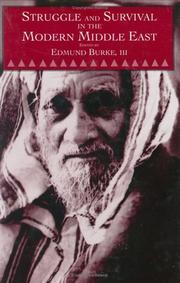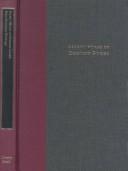| Listing 1 - 10 of 357 | << page >> |
Sort by
|
Book
ISBN: 9780520273818 9780520957992 132207609X 9781322076096 0520957997 0520273818 Year: 2014 Publisher: Oakland, California University of California Press
Abstract | Keywords | Export | Availability | Bookmark
 Loading...
Loading...Choose an application
- Reference Manager
- EndNote
- RefWorks (Direct export to RefWorks)
Alone among Muslim countries, Morocco is known for its own national form of Islam, Moroccan Islam. This book reveals that Moroccan Islam was actually invented in the early twentieth century by French ethnographers and colonial officers who were influenced by British colonial practices in India.
Islam and state --- Islam --- French --- Frenchmen (French people) --- Ethnology --- Mosque and state --- State and Islam --- State, The --- Ummah (Islam) --- History --- Intellectual life. --- Morocco --- France --- Religious life and customs. --- Colonies --- Religion. --- Empire chérifien --- Maroc --- Marokko --- Maroko --- Mamlakah al-Maghribīyah --- Marruecos --- Kingdom of Morocco --- Kingdom of Morrocco --- Morrocco --- Marrocos --- Marrakesh (Kingdom) --- Royaume du Maroc --- Marruecos Francés --- Mamlaka al-Maghrebia --- Pʻŭrangsŭ --- Frankrig --- Francja --- Frant︠s︡ii︠a︡ --- Prantsusmaa --- Francia (Republic) --- Tsarfat --- Tsorfat --- Franḳraykh --- Frankreich --- Fa-kuo --- Faguo --- Франция --- French Republic --- République française --- Peurancih --- Frankryk --- Franse Republiek --- Francland --- Frencisc Cynewīse --- فرنسا --- Faransā --- Franza --- Republica Franzesa --- Gallia (Republic) --- Hyãsia --- Phransiya --- Fransa --- Fransa Respublikası --- Franse --- Францыя --- Frantsyi︠a︡ --- Французская Рэспубліка --- Frantsuzskai︠a︡ Rėspublika --- Parancis --- Pransya --- Franis --- Francuska --- Republika Francuska --- Bro-C'hall --- Френска република --- Frenska republika --- França --- República Francesa --- Pransiya --- Republikang Pranses --- Γαλλία --- Gallia --- Γαλλική Δημοκρατία --- Gallikē Dēmokratia --- فرانسه --- Farānsah --- צרפת --- רפובליקה הצרפתית --- Republiḳah ha-Tsarfatit --- פראנקרייך --- 法国 --- 法蘭西共和國 --- Falanxi Gongheguo --- フランス --- Furansu --- フランス共和国 --- Furansu Kyōwakoku --- Francija --- Ranska --- Frankrike --- France (Provisional government, 1944-1946) --- モロッコ --- Morokko --- モロッコ王国 --- Morokko Ōkoku --- Марокко --- Marocko --- Maghrib --- Morocco (Spanish zone) --- 프랑스 --- Falanxi --- Fa-lan-hsi --- 法蘭西 --- Frankrijk --- Frant︠s︡ --- Франц --- Frant︠s︡ Uls --- Франц Улс --- Islam. --- Ethnologie. --- Franzosen. --- Kolonie. --- Volksreligion. --- Religiöst liv. --- French colonies. --- Islam and state. --- Intellectual life --- 1900-1999. --- Marokko. --- North Africa. --- Morocco. --- Religion --- Historia. --- african history. --- british colonialism. --- british imperialism. --- colonial officers. --- colonial policies. --- colonialism. --- early 20th century history. --- empire. --- european colonialism. --- french colonialism. --- french ethnographers. --- french imperialism. --- india. --- invention of traditions. --- islam. --- mission scientifique du maroc. --- modern polity. --- modernity. --- monarchy. --- moroccan islam. --- moroccan studies. --- morocco. --- muslim countries. --- muslim. --- national form of islam. --- north african history. --- orientalism. --- political. --- religion. --- religious studies. --- state formation.
Book
ISBN: 2819938140 4057664627360 9700000002173 Publisher: S.l. : Pub One Info,
Abstract | Keywords | Export | Availability | Bookmark
 Loading...
Loading...Choose an application
- Reference Manager
- EndNote
- RefWorks (Direct export to RefWorks)
Classic text republished as an e-book.
Book
ISBN: 281994728X 4057664164155 Publisher: S.l. : Pub One Info,
Abstract | Keywords | Export | Availability | Bookmark
 Loading...
Loading...Choose an application
- Reference Manager
- EndNote
- RefWorks (Direct export to RefWorks)
Classic text republished as an e-book.

ISBN: 185043607X 1850436053 Year: 1993 Publisher: London Tauris
Abstract | Keywords | Export | Availability | Bookmark
 Loading...
Loading...Choose an application
- Reference Manager
- EndNote
- RefWorks (Direct export to RefWorks)

ISBN: 1614877815 9781614877813 0865971668 0865971676 9780865971677 0865972532 0865972540 Year: 1999 Publisher: Indianapolis, Ind. Liberty Fund
Abstract | Keywords | Export | Availability | Bookmark
 Loading...
Loading...Choose an application
- Reference Manager
- EndNote
- RefWorks (Direct export to RefWorks)
Great Britain --- France --- United States --- Politics and government --- Colonies --- History --- Relations --- Economic order
Book
ISBN: 113981446X 1108061281 Year: 1790 Publisher: Place of publication not identified : Cambridge : publisher not identified, Cambridge University Press
Abstract | Keywords | Export | Availability | Bookmark
 Loading...
Loading...Choose an application
- Reference Manager
- EndNote
- RefWorks (Direct export to RefWorks)
Regarded as a founder of modern conservatism, Edmund Burke (1729-97) proved an influential yet controversial writer and politician. Although sympathetic towards American colonists in their grievances against British rule, he was later appalled as the French Revolution unfolded. Published in 1790, when the Revolution was still young, this is Burke's most well-known work and remains a classic of Western political thought and rhetoric. He predicts the excesses that will follow the destruction of the institutions of civil society, and the inevitable rise of a corrupt and violent government rather than a protector of citizens. When she read the famous passage describing her flight from Versailles, Marie Antoinette was apparently moved to tears. Sparking a flurry of responses in defence of the Revolution and its ideals, including Thomas Paine's Rights of Man (also reissued in this series), Burke's polemic remains a crucial text in the history of modern political philosophy.
Public opinion --- History --- France --- Foreign public opinion, British. --- Burke, Edmund,
Book
ISBN: 1107360498 1108067204 Year: 2014 Publisher: Cambridge : Cambridge University Press,
Abstract | Keywords | Export | Availability | Bookmark
 Loading...
Loading...Choose an application
- Reference Manager
- EndNote
- RefWorks (Direct export to RefWorks)
By the eighteenth century, the term 'sublime' was used to communicate a sense of unfathomable and awe-inspiring greatness, whether in nature or thought. The relationship of sublimity to classical definitions of beauty was much debated, but the first philosopher to portray them as opposing forces was Edmund Burke (1729-97). Originally published in 1757 and reissued here in the revised second edition of 1759, this influential treatise explores the psychological origins of both ideas. Presented as distinct consequences of very separate emotional lineages, beauty and sublimity are traced back through a web of human feelings, from self-preservation instincts to lust. Burke's doctrine of the sublime was to have far-reaching effects. In Britain, it informed perceptions of landscape in art and literature for years to come. Meanwhile, on the continent, Kant regarded Burke as 'the foremost author' in 'the empirical exposition of aesthetic judgments'.
Aesthetics --- Sublime, The --- Radio broadcasting Aesthetics
Book
Year: 1891 Publisher: Londres: Cassell,
Abstract | Keywords | Export | Availability | Bookmark
 Loading...
Loading...Choose an application
- Reference Manager
- EndNote
- RefWorks (Direct export to RefWorks)
Book
Year: 1791 Publisher: A Paris: [éditeur inconnu],
Abstract | Keywords | Export | Availability | Bookmark
 Loading...
Loading...Choose an application
- Reference Manager
- EndNote
- RefWorks (Direct export to RefWorks)
Book
Year: 1978 Publisher: Harmondsworth : Penguin Books,
Abstract | Keywords | Export | Availability | Bookmark
 Loading...
Loading...Choose an application
- Reference Manager
- EndNote
- RefWorks (Direct export to RefWorks)
| Listing 1 - 10 of 357 | << page >> |
Sort by
|

 Search
Search Feedback
Feedback About UniCat
About UniCat  Help
Help News
News